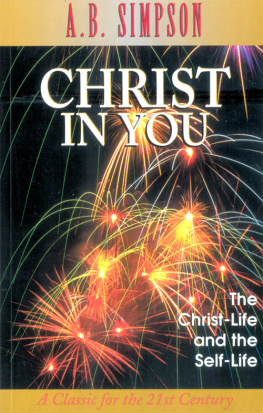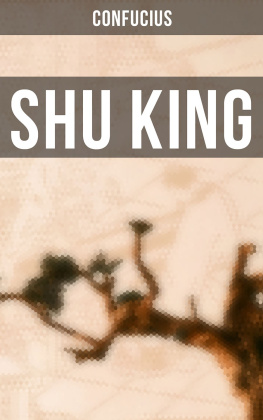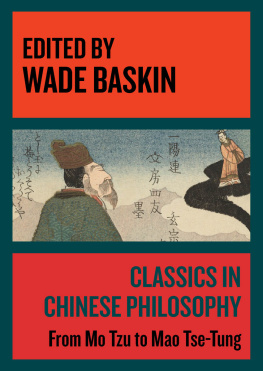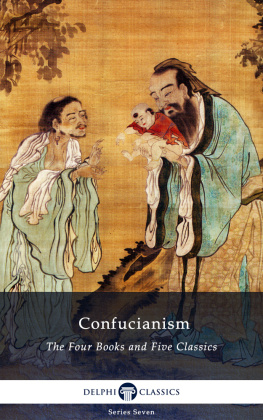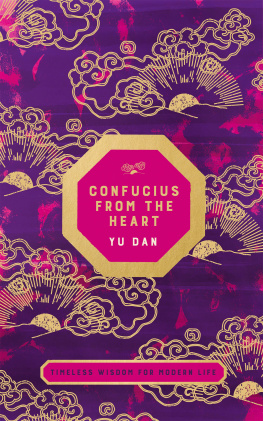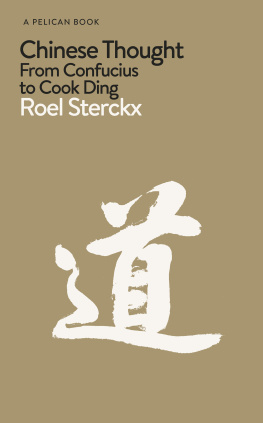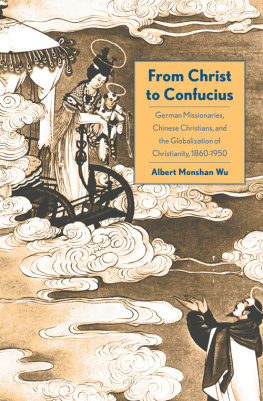Gregg A. Ten Elshof - Confucius for Christians: What an Ancient Chinese Worldview Can Teach Us about Life in Christ
Here you can read online Gregg A. Ten Elshof - Confucius for Christians: What an Ancient Chinese Worldview Can Teach Us about Life in Christ full text of the book (entire story) in english for free. Download pdf and epub, get meaning, cover and reviews about this ebook. year: 2015, publisher: Wm. B. Eerdmans Publishing Co., genre: Home and family. Description of the work, (preface) as well as reviews are available. Best literature library LitArk.com created for fans of good reading and offers a wide selection of genres:
Romance novel
Science fiction
Adventure
Detective
Science
History
Home and family
Prose
Art
Politics
Computer
Non-fiction
Religion
Business
Children
Humor
Choose a favorite category and find really read worthwhile books. Enjoy immersion in the world of imagination, feel the emotions of the characters or learn something new for yourself, make an fascinating discovery.

- Book:Confucius for Christians: What an Ancient Chinese Worldview Can Teach Us about Life in Christ
- Author:
- Publisher:Wm. B. Eerdmans Publishing Co.
- Genre:
- Year:2015
- Rating:3 / 5
- Favourites:Add to favourites
- Your mark:
- 60
- 1
- 2
- 3
- 4
- 5
Confucius for Christians: What an Ancient Chinese Worldview Can Teach Us about Life in Christ: summary, description and annotation
We offer to read an annotation, description, summary or preface (depends on what the author of the book "Confucius for Christians: What an Ancient Chinese Worldview Can Teach Us about Life in Christ" wrote himself). If you haven't found the necessary information about the book — write in the comments, we will try to find it.
Confucius for Christians: What an Ancient Chinese Worldview Can Teach Us about Life in Christ — read online for free the complete book (whole text) full work
Below is the text of the book, divided by pages. System saving the place of the last page read, allows you to conveniently read the book "Confucius for Christians: What an Ancient Chinese Worldview Can Teach Us about Life in Christ" online for free, without having to search again every time where you left off. Put a bookmark, and you can go to the page where you finished reading at any time.
Font size:
Interval:
Bookmark:
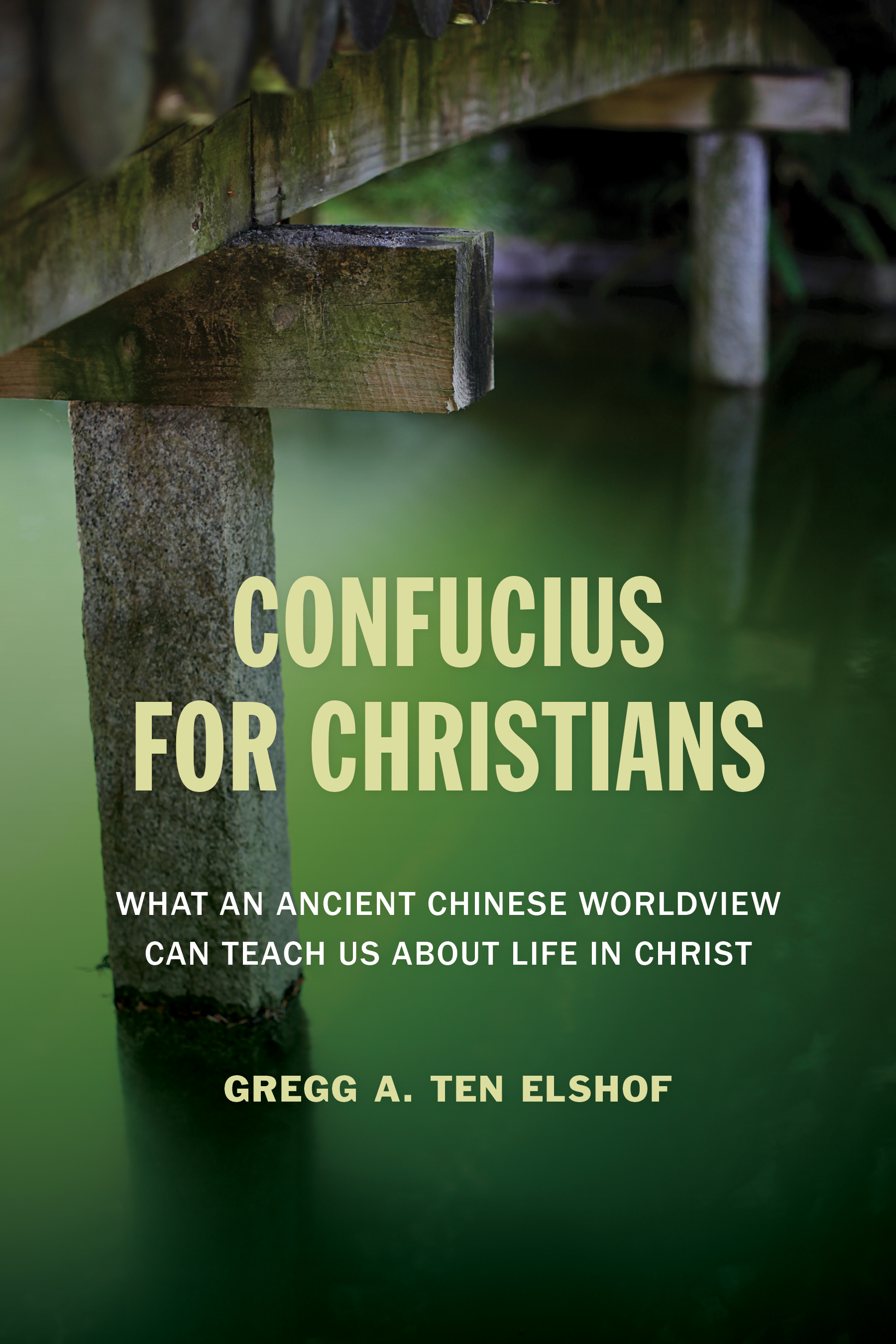
Confucius
for Christians
What an Ancient Chinese Worldview
Can Teach Us about Life in Christ
Gregg A. Ten Elshof
William B. Eerdmans Publishing Company
Grand Rapids, Michigan / Cambridge, U.K.
2015 Gregg A. Ten Elshof
All rights reserved
Published 2015 by
Wm. B. Eerdmans Publishing Co.
2140 Oak Industrial Drive n.e. , Grand Rapids, Michigan 49505 /
p.o. Box 163, Cambridge cb3 9pu U.K.
Printed in the United States of America
Library of Congress Cataloging-in-Publication Data
Ten Elshof, Gregg A., 1970
Confucius for Christians: what an ancient Chinese worldview
can teach us about life in Christ / Gregg A. Ten Elshof.
pages cm
isbn 978-0-8028-7248-7 (pbk.: alk. paper)
eisbn 978-1-4674-4412-5 (ePub)
eisbn 978-1-4674-4372-2 (Kindle)
1. Christianity and other religions Confucianism.
2. Confucianism Relations Christianity.
I. Title.
BR128.C43T45 2015
261.29512 dc23
2015017964
www.eerdmans.com
Contents
T his book, more than anything else Ive ever written, is not my own. It is the product of countless conversations over the past ten years or so. I am so very grateful to Dr. Thomas Leung for introducing me to the beauty and power of the Confucian wisdom tradition and for inspiring reflection on its relationship to the Way of Jesus. Im also grateful to Gary Miller for dragging me into the unknown. Many of the ideas in the book were shaped in a seminar that I taught in the Spring of 2013 at Biola University. This book belongs in part to the students of that seminar. Im especially grateful to Louys Gackstetter for his help in pulling things together. Though my conversation partners concerning this book are too numerous to remember or mention, I do wish to thank the following friends and colleagues for their patience with me and for their help as I worked through these ideas: Andrew Bailey, David Bratt, Jason Baehr, Thomas Crisp, Melodie Holden, Jim Houston, Jasmeet Kennington, Michael Pace, Steven Porter, Dan Speak, Dallas Willard, and Amos Yong.
Im grateful to have received from Biola University a sabbatical leave to complete the manuscript. And Im forever grateful to God for Laurel, Silas, Larkin, and Gideon. This center of love infuses everything I do with joy and meaning.
Finally, the book is dedicated to my parents, Gene and Judy Ten Elshof who, by generously and effortlessly giving themselves to me and to countless others, beautifully embody many of the principles discussed in these pages.
I was born a Christian. And I was born a Westerner.
Of course, theres a perfectly good sense in which neither of those things could be true. We all know that you cant be born a Christian any more than you can be born a Marxist. And the same goes for the tendency to think in categories given to us from the Western wisdom tradition.
On the other hand, Ive understood the world in Christian categories for as long as it has made sense to say of me that Ive understood the world. Ive been thinking in Christian categories for as long as Ive been thinking. While Ive had a conversion experience, Ive never had a conversion experience that took me from some wholly other way of thinking about and understanding the world to a Christian way. Nor have I ever had a conversion experience that took me for the first time into a basic orientation of loyalty to and trust in the person of Jesus Christ. Ive embodied a basic orientation of loyalty and trust toward Jesus Christ for as long as it has made sense to say of me that Ive trusted anything or manifested loyalty to anyone. Such are the blessings of being raised in a Christian home. And the same is true of the Western wisdom tradition. Long before I had ever heard of Socrates, Plato, and Aristotle (not to mention Aquinas, Descartes, Hume, Kant, and Kierkegaard), my thinking had been deeply shaped by their suggestions about how to understand and talk about the world and my place in it.
So Ive been thinking as a Western Christian for as long as Ive been thinking.
It took me what now seems like an alarmingly long time to situate myself in those terms to see and appreciate the fact that the Western wisdom tradition is one among many, and that a Christian understanding of the world informed by Western philosophical categories and emphases is one among many ways of understanding the world as a Christian. To deviate from stereotypical Western patterns of thinking is not to be unthinking. And to deviate from stereotypical Western Christian thinking is not to abandon Christianity.
Perhaps all of this should go without saying. But when I reflect on my own intellectual journey, it occurs to me that, at least in many settings, it must be said. Im not sure where or when, but at some point in my intellectual training I took aboard the suggestion that the word Eastern, when used to modify nouns like philosophy, thought, or religion, had connotations like these: illogical, uncritical, nonsensical, relativistic, and dangerous. But a moments reflection is all it takes to recognize the absurdity of the suggestion that a philosophers location on the globe (To the East of what? one wonders) should conduce to any of these characteristics. Be that as it may, this is how I had been taught to think.
It is, of course, not absurd to suggest that some religions, philosophies, and patterns of thought are illogical, uncritical, nonsensical, relativistic, and dangerous. Sadly, our world is replete with religions, philosophies, and patterns of thought that satisfy each (if not all) of these descriptors. But that these patterns should be concentrated on one half of the globe (the East side) is what should strike us as implausible on its face. And it takes no more than an undergraduate-level survey of the history of Western thought to confirm the prevalence of these characteristics on the West side.
In 2005, the Provost of my university asked me to accompany him to China. The plan was to travel to several universities in Mainland China to give presentations to student and faculty groups on the nature of Christian higher education and scholarship. I had no real desire to go to China. I knew nothing of Chinas history or culture. But my boss boss boss was asking me to go. So who was I to say no?
Our guide was Dr. Thomas Leung, a Christian scholar who had been working hard to establish centers for the study of Christianity in the state universities in China. He was the first person I had ever met who self-identified both as a Christian and as a Confucian. This intrigued me.
In one of my early conversations with Dr. Leung, he explained one of the challenges facing Western Christian missionary efforts in China over the years. Well-meaning Western missionaries, in their attempt to make a Christian understanding of the world compelling, were unknowingly busy trying to propagate Western Christianity Christianity articulated in categories and with emphases at home in the Western philosophical tradition. As a result, Chinese audiences were being asked not only to embrace Christian thinking, but to abandon their native Confucian wisdom tradition a rich tradition stretching back thousands of years and which informs the most fundamental structures of life and social interaction in China.
Audiences in the West are not characteristically presented with such stark options. Because the Christian story is articulated in categories and with emphases at home in the Western philosophical tradition, these audiences are offered the opportunity to embrace the Christian story without wholesale abandonment of the rich wisdom tradition that stretches back to Socrates and Plato and informs the most fundamental structures of life and social interaction in the West.
Font size:
Interval:
Bookmark:
Similar books «Confucius for Christians: What an Ancient Chinese Worldview Can Teach Us about Life in Christ»
Look at similar books to Confucius for Christians: What an Ancient Chinese Worldview Can Teach Us about Life in Christ. We have selected literature similar in name and meaning in the hope of providing readers with more options to find new, interesting, not yet read works.
Discussion, reviews of the book Confucius for Christians: What an Ancient Chinese Worldview Can Teach Us about Life in Christ and just readers' own opinions. Leave your comments, write what you think about the work, its meaning or the main characters. Specify what exactly you liked and what you didn't like, and why you think so.


